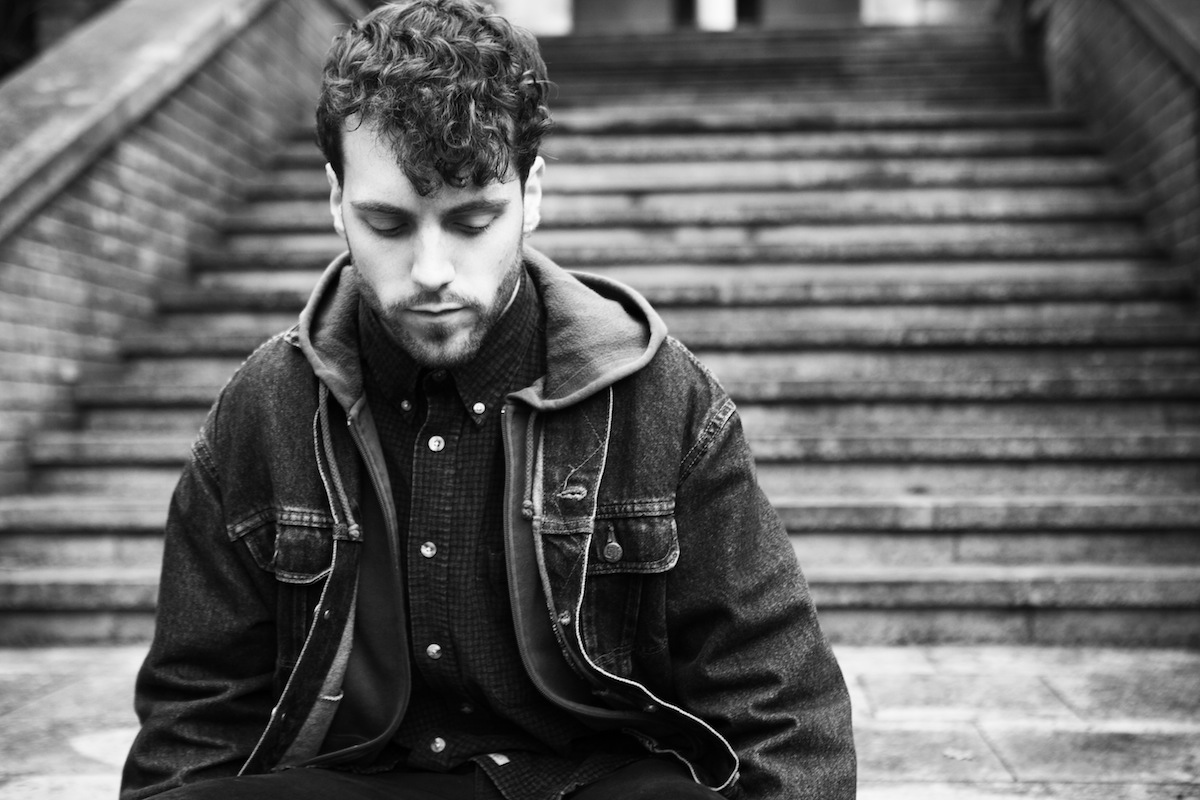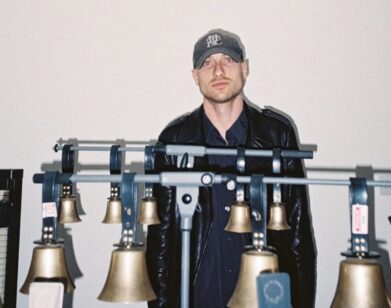Discovery: William Arcane

ABOVE: WILLIAM ARCANE. PHOTO COURTESY OF VIC LENTAIGNE
For a music producer, the name William Arcane sounds too perfect to be real, and it is—the artist’s real name is William Serrell. But his alter-surname perfectly expresses the London-based electronic artist’s status in a rapidly evolving music world: his balanced and extensive musical history (in taste, ranging from classical to metal; in performance, from clarinet to guitar) mixes with a natural feel for catchy atmospheric sound that feels almost quaint. Aficionados seem to agree, if judging by the Arcane mixes appearing on tracks by Bonobo and Jamie xx, and his slew of upcoming tour dates across Europe.
Arcane’s EP Reflected, out today, consists of only two A- and B-side tracks, titled “Reflected” and “Fade,” respectively. In style, the songs sound similar enough that the memory of the other is indeed a faded reflection. Opening with rainy-day grayscale ambience, both morph into danceable—yet complicated—patterns, backed by Arcane’s quiet vocals and breathy wind instrumentals. We spoke to Arcane about the importance of being persistent, kind metalheads, and how accidental album downloads can change your life.
HOMETOWN: Norwich, England.
WILLIAM, WILLIAM, QUITE CONTRARY: They didn’t really put a lot of time into music and art at the schools I was in, and I think because I got to do it so little, I wanted to do it more. The focus was on all the really boring subjects to me, which was sort of English and maths and stuff I just didn’t enjoy. My mum was musical—she played classical clarinet and piano—so I played clarinet for a while when I was younger, and I was always sort of playing different instruments. Guitar was my main instrument for a while. I played that for around 12 years, and I still play it now.
HOW IT ALL BEGAN: I didn’t really get into electronic music until I was about 15 or 16. When I was younger I was into heavier stuff, like metal. I just used to love those kinds of gigs—there was just so much energy, and people were so passionate about the music, and it was just a really good kind of scene. I always found it quite funny, because in that scene you’d get these menacing looking people but they’re really the nicest people in the world and there’s really this kind of community feel. I felt like I belonged there. I was more into that sort of music at first, then when I was 15 or 16, I went to download an album—which I thought was something else—and it turned out it was an album by a producer called Distance. He does sort of dark dubstep-y stuff, and I loved it and got into more dub kind of stuff, and it just went from there. That’s the great thing about the Internet, you can always stumble across good music.
WINNING LONDON: I was studying when I first came to London, because I was at university at Ravensboard, in North Greenwich. It’s a really great uni, and I learned a lot of stuff there and had a lot of time for production. I studied popular music, but I also did a course in sound design as well. I thought London would be a really cold place, because everyone talks about how people on the London Tube don’t talk to each other and all hate each other and whatnot, but it really wasn’t that bad. [laughs] I think if you’re younger, it’s a really great place. But I think there are a lot of lonely people in London, which is quite sad. They work their asses off in the daily grind of London, and I imagine it could go one of either two ways if you move here. You could settle in or you could feel like you’re exiled and feel quite alone.
NOM DE STAGE: Originally, I went for just “Arcanes,” and then I decided I wanted to give it more of a name-name. I think people connect a bit more to an actual human name. [laughs] I just kind of threw it at the end of my own name, and I thought it sounded good.
HOW TO SUCCEED IN ELECTRONIC MUSIC BY REALLY TRYING: I would say persistence with emailing people? [laughs] I literally just hounded people to listen to my music, because there’s just so much out there that it could just get lost in a sea of music. All of these artists pop up and it’s difficult to get anyone to pay attention to you.
TURNING POINTS: I think it was when I started getting support from bigger artists like Bonobo and Jamie xx, they’re putting my music in mixes and stuff. For me, that was just like, “Wow, these are people I admire and I enjoy listening to,” and that was a really big deal for me. It’s quite exciting.
THE ELECTRONIC MUSIC SCENE: People take it very seriously here. [laughs] I think you’ve got two types of people at electronic shows. There are the people who are there because they’re fanatical about the music—literally, they love it, they can’t get enough of it. And then you’ve got the people who just want to fit in and kind of be part of something that’s current and quite interesting. There’s a lot of cool people, as you call them, who are very reserved at shows, and they sort of stand there with cold stares and analyze the music really hard, but definitely after shows, you get people who will come up to you and chat with you and say they enjoyed the music and ask where they can find more and stuff like that.
DISCERNING TASTE: I listen to electronic music, but very select things. I’m not into dance-y stuff. It’s very obnoxious, isn’t it? I couldn’t put on a house track in my room and listen to it. It doesn’t really connect with me on that level. That type of music is more for when you go out. In my own time I like to listen to all sorts, but not specifically electronic music. The whole band setup just stopped working for me, I don’t know what it was. I think I listened to too many indie-rock bands, and I was getting into electronic music, which I just found a lot more interesting. With electronic music, there were people who were making sounds that you’ve never heard before, and they could do a lot more with the soundscape as a whole, and I just found that a lot more engaging to listen to. There are bands that I actually love, so it just depends on the band, really. New indie bands, there’s certain ones that shine through, but there’s a lot that I feel are just recycled versions of other bands. But whenever I describe what kind of music I make, I always say the same thing: I always kind of “umm” and “err” and just say it’s downtempo electronic, easy listening, something like that. [laughs]
INSPIRATIONS: The top artist for me is Thom Yorke. Everything he’s done with either Radiohead or Atoms for Peace, or even his solo stuff, I think is just phenomenal, whether it’s singing, production, or live performance. I saw him live and he’s just amazing—his possessed kind of man, it’s crazy. I’m a fan of Arthur Russell as well, and Antony Hegarty—he’s from Antony and the Johnsons, but he’s done some solo stuff as well. I’d say they’re probably my top three.
PRESENT TENSE: I quite like how things are now. I think that the time period that we live in today is quite switched-on, people are aware, and musically, there’s a lot of interesting stuff going on. I’ve got friends who are really into rock-‘n’-roll and kind of older ’60s stuff, but I think if they lived back then there would be bad points as well as the good points overall.
ON PROCESS: I’ve spent the last best part of the year in the studio, just really honing in on my sound. I’d say it’s matured quite a lot, compared to what I’ve started out with. I’d say there’s more song structure and the instrumentation is a little more minimal. There’s more focus on the vocals, so it’s more stripped-back sound and less busy sound. It comes across as more sophisticated. Now, what I’m trying to do is write songs on piano first, so it’s actually a song first, and then translate that into something electronic, and then mess with it a bit more on the programming side. I think a lot of producers will make a song—and albeit, it could be a great song—and they’ll throw in samples and stuff like that, but the end result is… I don’t know. I quite enjoy a structured song, with melody, and nice harmony, and I just think that aspect of songwriting can get lost a little in electronic music.
ON THE FUTURE: I’m either making a song, or I’m not making a song. That’s all I do. I definitely can’t see myself doing anything else. Along the way I’d kind of like to perhaps start running a label, which would be really cool, but I’ll always be doing music for sure. I can’t do anything else, really. [laughs]
WILLIAM ARCANE’S REFLECTED IS OUT NOW VIA PICTURES RECORDS. FOR MORE ON THE ARTIST, PLEASE VISIT HIS FACEBOOK PAGE.






